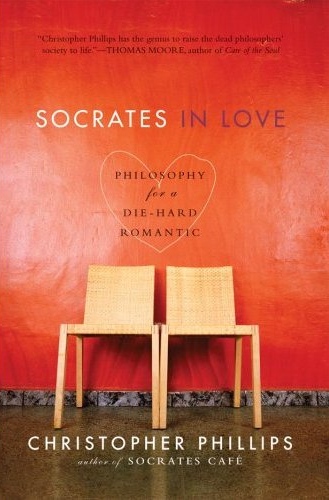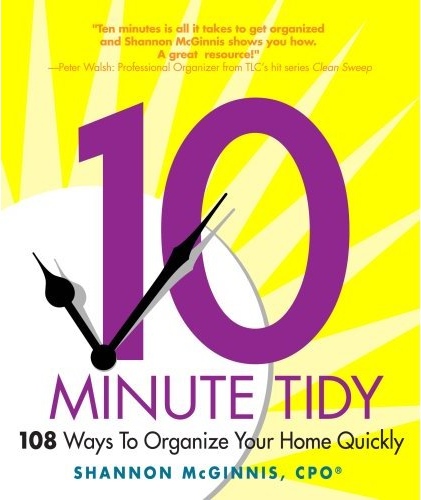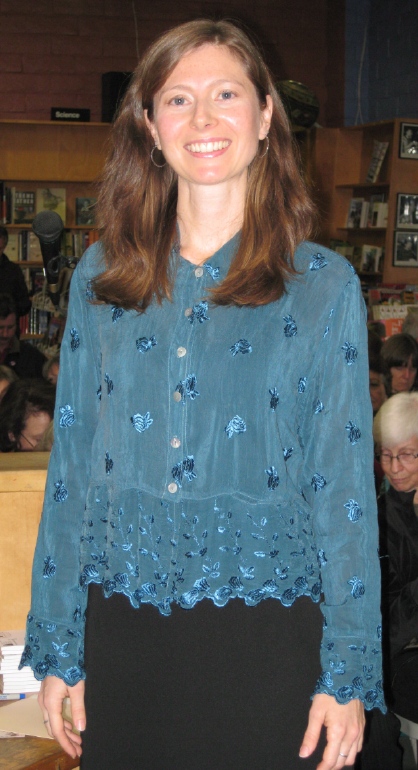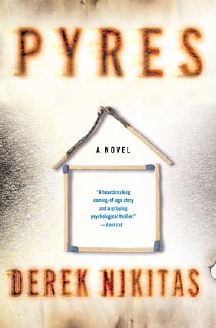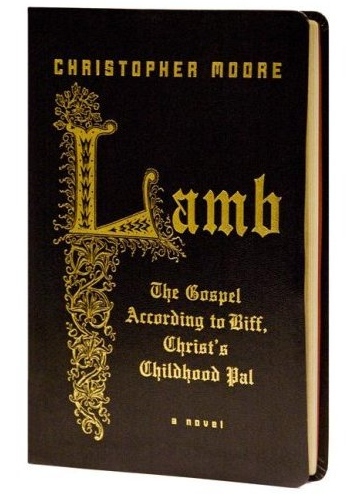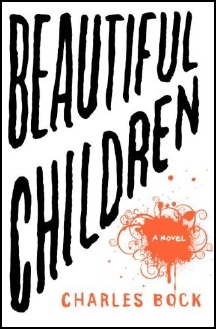|
|
|
|
This Just In...News
From The Agony Column
|
| |
|
02-15-08: Clive Barker is 'Mister B. Gone' ; Agony Column Podcast News
Report : A Conversation with Bob Eggleton
|
Changing the
World One Word At a Time
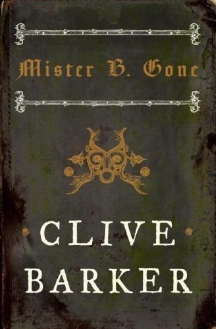 |
|
| Hidden
in the words; great interior design, but the cover lacks. |
Clive Barker changed
a lot of people's worlds. Whether with his ground-breaking, "future
of horror" 'Books of Blood' or his rule-breaking 'Hellraiser'
films, Barker's claim to having actually created Work That Matters
is undisputed. Barker is still all about changing the world, even if
he's not quite so intent on doing it himself, at least with his latest
work, 'Mister B. Gone' (HarperCollins ; October 30, 2007 ; $24.95).
Dont expect the transformational Barker to flay your skin and
change your world. In 'Mister B. Gone', Barker is writing about how
someone else changed the world, or perhaps, brought it to an end. That
would be Johannes Gutenberg, who in creating the printing press, apparently
damn near ended the world.
'Mister B. Gone' is told in the first person by one Jakabok Botch, who from
the get-go urges the reader to burn the book, burn it now. This is a pretty
risky strategy, since a pretty large proportion of the readership is going
to want to do just that as the story unfolds in a manner most different from
Barker's other work. Jakabok Botch is a minor demon trapped in the Ninth
Circle of Hell, the son of a large and violent, but also minor demon whom
he calls Pappy Gatmuss. It doesn't take long for Jakabok to get himself yanked
out of hell and thrust into fifteenth-century Germany, where the angels of
heaven and the demons of hell are gathered to witness or perhaps just to
usher in the end of the world – with the printing press.
Barker is definitely not playing his usual games here. 'Mister B. Gone' is
a very different read from almost anything else he has written. There's not
a lot of fear here beyond the wheedling and cajoling of the reader to burn
the book, which does have a way of getting under your skin. It's a paranoid
fear that Barker's never created with prose before and while I found it pretty
effective, if you're looking for 'Rawhead Rex'-style terror, move along.
In fact, Barker even manages to describe scenes of despicable violence without
evoking so much as a shiver, simply because his character, and the reader
as well, find it all so humdrum. Bathing in babies' blood? Done that. Jakabok
Botch is really pretty much a normal guy, well, other than the fact that
he's a baby-slaying hideously-burned monster. In some senses, this is almost
a bildungsroman about the life of a young demon who just happens
to stumble upon something very significant – the end of the world as
it was once known and the beginning of the world as we know it.
Barker's on a jag about words and the power of words, not just to convey
information, but to create new realities that undermine the current consensus.
It's a theme that, once you get past the death, the violence and the not-horrific
horror, is pretty damn interesting. For Barker it's a very odd book, like
a triple X-rated Twilight Zone polemic. But it's short, snappy and employs
Barker's usual prose to a rather unusual end. Barker is capable himself of
changing the world with his words. This book wont do that. But what
it will do is make you think about words, and the Singularity ushered in
by Gutenberg. Nothing was the same after the invention of the printing press.
Eventually, it would be used to print 'Mister B. Gone' – a thought
that would probably have frightened Gutenberg as much as the appearance of
any devil or angel.
|
Agony Column
Podcast News Report : A Conversation with Bob Eggleton
|
|
Owned
and created by BOB EGGLETON. Borrowed by me. Very cool!
|
Science fiction
art is vitally important to the life of the written genre. Artists
like Bob Eggleton don't just sell books – which
is vital – they also influence the reading experience either
directly, by illustrating characters and events found in the books,
or indirectly, by providing an ambience that informs the reading. I
spoke with Eggleton about how he started (early) and his first experiences
of art in college in the late 1970's, when the sort of art he was interested
in pursuing was not even in the frame for those teaching art in an
academic environment. You
can hear the MP3 of our conversation here. I'll leave the pictures
up to Eggleton.
|
| |
|
02-14-08: Agony Column Podcast News Report : Christopher Phillips Chats
Up 'Socrates in Love: Philosophy for a Die-Hard Romantic'
|
Oddly On-Topic
Readers may have
noticed that I generally try to avoid holiday-themed articles. Well,
it's not so much that I try to avoid them, but rather that I wont
lift a finger to find something holiday-appropriate. So here, for I
believe the first time ever, I'm oddly on-topic when I offer up my
interview with Christopher Phillips, author of 'Socrates
in Love : Philosophy for Die-Hard Romantic' (W. W. Norton ; February
8, 2008 ; $14.95). As with many of my interviews, I came across this
one via Capitola Book Café. It was kismet, destiny, you-name-it.
The upshot was that I found myself racing through a fascinating written
and social experiment. What happens when you get a bunch of folks who
dont know you and dont necessarily know one another together
to talk about the Philosophy of Love? The answer – three hundred-something
pages organized around five forms of love by a writer with a philosophic
bent and a great prose voice. You get to thinking.
|

|
Christopher
Phillips
|
'Socrates in Love'
is based on Phillips' "Socrates Café" concept. It's
pretty simple and very smart. CF above, get people together and engage
them in Socratic dialogues about Socratic subjects in a Socratic manner.
Be sure to remain in the 21st century even if the concepts youre
discussing first popped up back in the Before-Time. In between the
dialogues, take your readers on a journey through the pinnacles of
the ideas youre discussing. Keep it short, to-the-point, witty
and interesting. Repeat, across the country, then around the world.
Write up the books, let 'em sell like hotcakes and maybe the world
is actually a better place afterwards. Beat back the forces of despair.
Not a bad plan and well-executed.
'Socrates in Love' is extremely organized. It's divvied up into five sections,
one for each of the five forms of love identified by Socrates; Eros (erotic
love), Storge (love of family), Xenia (love of strangers), Philia (love of
friends) and Agape (unconditional love). In each section, Phillips conducts
a couple of cafés in a variety of locations, many of them powerfully
significant; think Hiroshima Park. As he explores all the permutations of
love, both historically and in his conversations with the public, Phillips
is most assuredly going to succeed at his goal, which is simply to expose
the reader to ideas they may not have heard expressed in a new and interesting
manner. Phillips is not here to offer you advice, or tell you what to do
or think; this isnt a self-help book, nor is it, a philosophical work
in the sense that he's trying to impress upon the reader a vision of reality
or a model for living. Instead, Phillips and those he speaks with will simply
make you think.
Phillips of course has a
website, but he also has a website for The
Society for Philosophical Inquiry, a way for those involved in
his Socrates Café gatherings to keep in touch and spread the
word. It's worth your valuable time to investigate – assuming
you have a philosophically inquiring mind. The very idea of people
gathering to talk about philosophy is appealing, even if you're not
inclined to join them.
I spoke with Phillips and we talked at length about the varieties of love
and kept returning to the romantic form of love, the holiday-appropriate
form of love. I have to say that Phillips was true to his word, and managed
to take the interview in directions I hadn't foreseen. You can hear the results
from this MP3 link. It
turns out that Phillips and I ended up having a dialogue about love. Interesting,
that.
|
| |
|
02-13-08: Agony Column Podcast News Report Shannon McGinnis 'The 10 Minute
Tidy'
|
Clear the Clutter
|
|
I
wish my website was this tidy!
|
I know precisely
where left field is and when to go there fast. I trust that readers
can imagine the look on my producer's face, the sound of the bookstore
event manager's voice and the look on my wife's face when I told each
of them I intended to interview Shannon McGinnis, author of '10 Minute
Tidy: 108 Ways to Organize Your Home Quickly' (Organized 4 Success!
; 2007 ; $12.95). Somewhere between, "There's something deeply
wrong with you, Rick," and, "Seek therapy now, Rick",
north of, "What is in your tiny brain?" and south of, "Stop
acting so compulsively," all of them and the shattered remains
of my own fractured mind, wondered what I was up to.
What I was up to was a 216-page book about the size of the largest Post-It
notes you could reasonably use that was just chock full of good advice. Shannon
McGinnis is a Certified Professional Organizer, and her book is wonderfully
simple in premise, promise and product. There are 108 things in this book
that take about ten minutes to do. None of them will Save the Whales, the
World or even A Tree. What that they will save is time, down the line, for
those who do them, as well as make your world nicer, neater – and tidier!
|
|
Shannon
at Capitola Book Café.
|
Now, understand that this advice is coming from a gentleman who hangs blue
shirts on blue hangers and white shirts on white hangers. (Yet has stacks
of books in each of the chairs surrounding the should-be dining table. Go
figure.) I'm already fairly tidy, if not a bit on the compulsive side, which
should explain my interest in the book.
However, there was a lot more to
this book than the simple tips, which are plentiful and practical. I went
to the Capitola Book Café to meet Shannon McGinnis, and delve into
the world of Certified Professional Organizers. I asked her how one might
go about becoming a CPO, and we talked about clutter. McGinnis has a great,
useful definition of clutter that in itself will help you begin to beat the
clutter back. And refreshingly, she covers all sorts of tidy, from your bedroom
closet to your computer desktop, your email reader and even your finances.
And just to demonstrate how practical and useful her advice is, let me mention
that she suggests you back up your computer. I spent many years in the IT trenches
backing up computers, and hearing this was music to my ears.
You may think you know some
of this stuff, but having it all in one compact book is a really great help.
You can find more help from Shannon's
website.
One of the things we talked about was people's hesitation to seek professional
organizing help. But with the science-fictionally fast pace of our lives,
we have good reason to need and seek expert help. Want an
example? You
can hear my conversation with Certified Professional Orangizer Shannon McGinnis
from this
MP3 link. And while you're listening,
pick up the living room!
|
| |
|
02-12-08 : Terry
D'Auray Reviews 'Pyres' by Derek Nikitas ; Agony Column Podcast News
Report : Chatting With Christopher Moore at Capitola Book Café
|
Edgar Nominee,
Best First Novel
|
|
Do
not build your house out of matches. Bad idea.
|
I like the Edgar
Awards; I think they do things right, and the Best First Novel Category
is a great idea, since it uses the award process to get the word out
about new writers readers may not have otherwise heard of. It's nice
to see an award that helps jump-start writers' careers. Even if a writer
doesn't win the Edgar for Best First Novel, just by virtue of having
been on the list, each of those nominated gets a bit of extra attention
at the beginning of their career that could really help them keep up
the work.
All of this is just a wind-up for Terry
D'Auray's review of 'Pyres' by Derek Nikitas, which
has been nominated for an Edgar for Best First Novel. She likes it and she's
not easily pleased. While 'Pyres' is a mystery, it's not a police procedural
or a detective story; it's a drama about a teenage girl that involves some
surreal visions, which of course, makes it very appealing to both me and,
I'd suspect, most of my readers, regardless of whether or not they're mystery-readers. Here's
Terry's erudite and succinct review. Prepare to add another book to your
stack!
|
Agony Column
Podcast News Report : Chatting With Christopher Moore at Capitola
Book Café
|
|
| Bringing
back the memories of old Actual Bibles. |
Yes, it's a bit
of a whirlwind, but at the last minute, I managed to sneak over to
Capitola Book Café for a brief chat with Christopher
Moore, on tour this Valentine's Day week to promote 'You
Suck', which is, after all, advertised as a "Love Story".
Sure, it's got more death than the usual love story, and more blood-drinking
than the usual Love Story, but there is identifiable (if sort of teenager
puppy-like) love at the heart of this totally entertaining novel. Now,
we heard all about that last year, but if you've not got round to reading
it, it's well worth your time – so long as you've read 'Bloodsucking
Fiends', which is the first book in this series that also includes
'A Dirty Job'
(sort of; it's a Christopher Moore sort of thing.)
I do have to take this opportunity to mention the most recent Moore release,
'Lamb: The Special Gift Edition' (Wm. Morrow / HarperCollins ; October 27,
2007 ; $19.95), which is so totally cool, it almost beggars the imagination.
I dont know how many of you had or even still have one of those old-style,
gilt-edged Bibles. My grandmother – A Christian Scientist – had
one and just the sight of this book brings back the memories. And the novel
itself is so contrary to that which it mimics that the combination is irresistible.
No, 'Lamb' is not a condemnation of Christianity. But it does have Christ
as a character; not a usual or even an advisable tack to take when you're
sitting down to write a novel. But Moore is so generous with his characters
that 'Lamb' is going to please a lot of people who might think it should
be tossed in the 'Pyres'. And at a mere $20, it's amazingly, affordably cheap.
|
Moore's done more than a few of these special editions, so I hied myself
hence down to Capitola Book Café to find out what gives, because I
think it's an unusual little market to corner. You
can hear the results from this MP3 file, and I don't promise that he wont
say any offensive words. He will however, amuse you. This is of course
another good reason to read.
|
| |
|
A 2008 Interview With Charles Bock
|
'Beautiful Children' Review
The plans were made
easily – too easily. I called the studio in
New York, and the studio in San Francisco. Everybody agreed and exchanged
emails. I left for the San Francisco studio at 6 AM in the pouring rain.
I drove over Highway 17, featured in just about every episode of Red
Asphalt, with nary a problem. I managed to arrive in SF by 8:15, and
popped up to the studio, ready to sit down and talk with Charles
Bock,
author of 'Beautiful Children'. We had our chronology set. In New York,
it was 11:15. I was set up, ready to go; I turned off my cell phone,
as my children seem endowed with the psychic power to decide to call
me any time I've left my phone on during an interview. At 8:25, we call
up New York.
"Are you sure you booked the New York studio?" my engineer asked,
looking up from the phone. He had a new engineer helping him. She looked
worried.
I was sure; I'd received email confirmations from everyone. The interview
had been set up only a week before, so it was still fresh in my mind.
Charles Bock had come to NPR in New York – and been sent home.
That's what happens when you upgrade your scheduling software over a
weekend. I'm guessing that it was a Windows program. Turning on my cell
phone, I found two voicemails had arrived in the few brief minutes I'd
had it off, from both the author and the studio. It didn't take long
to sort out what happened. Fortunately, Charles lived fairly close to
the studio and he was back in a trice. Hookup was seamless, and my hosts
in SF generously offered me as much time as I needed, which was very
good. When we finally both sat down to talk, Charles and I were slightly
frazzled, but a bit more relaxed than we might have been. An inauspicious
start led to a fortuitous conclusion.
You
can hear my conversation with Charles Bock from this link.
It begins with two readings; the first an extended version of the reading
for the NPR report; the second a very short chapter that captures the essence
of Bock's powerful vision of a suburban marriage going quietly wrong.
These are followed by the interview.
You'll
see why he made such a great subject for my NPR
First Books report on his first novel, 'Beautiful
Children', which I review in-depth, but without spoilers, here. Bock is a lightning rod and an antenna, a hypersensitive
receiver and a powerful transmitter of emotions and impressions; aimed
at his childhood home of Las Vegas, he picks up and broadcasts the inner
core of the scrum of suburbs that surround Las Vegas, of the inhabitants
of those suburbs. I'm particularly pleased that even though things looked
dicey, they turned out ducky. I have to thank all my engineers around
the nation – what a miracle to get that kind of great voice replication,
so that you can have a really intimate conversation with someone on the
other side of the continent. Bock is a real find, as is his novel 'Beautiful
Children'. Plan on reading the latter after listening to the former – but
get a backup plan in case things go awry.
|
| |
|
|


